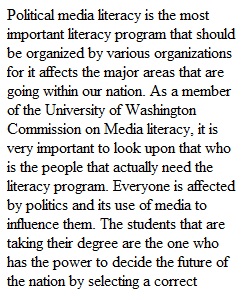


Q You have been appointed to the University of Washington Commission on Media Literacy. The commission’s task is to develop a public service campaign to promote political media literacy, with a particular focus on how to recognize and resist manipulative communication techniques. Your assignment is to draw from your knowledge about political media practices, strategies and media effects research to propose a plan for a political media literacy program. Clearly explain your goals, methods and strategies in promoting media literacy. Your proposal should will include: The target age group The particular type of media to be explored (for instance, political ads, cable news, print news, presidential press conferences, or something else?) Relevant scholarly concepts and theories (draw from Lesson 6 materials) The persuasion techniques you plan to use (draw from Chapter 8 in your textbook) Choose at least one of the suggestions Iyengar makes in Chapter 11, and explain how it might fit in to your proposal (for instance, using social media; encouraging a partisan press; strengthening public broadcasting, etc.) Media plan: How will the program be delivered? (online, through print materials, TV public service announcements, something else?) Your proposal should incorporate at least three of the following concepts, but you may draw from additional course concepts to develop you proposal: media bias, market forces, confidential sources, agenda setting, framing, paid vs. free media, pack journalism, watchdog function, The First Amendment, adversarial journalism. Write your proposal in the form of a memo to the committee chairperson. Memo should be no more than two pages, singled spaced, 12-point Times.
View Related Questions